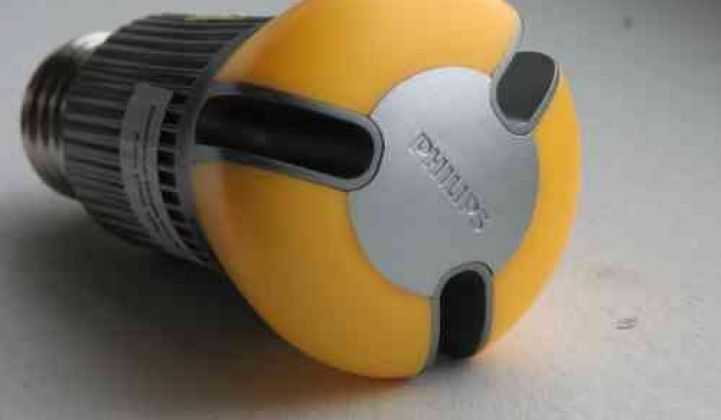I just spent the last two minutes unscrewing two Philips LED bulbs from lamps in my home office. And then I came to my computer to write about it.
Why? Because the bulb has been recalled by the U.S. Consumer Product Safety Commission for posing an electrical shock danger.
"A lead wire in the bulb’s housing can have an improper fitting, which can electrify the entire lamp and pose a shock hazard," reported the CPSC. (Hat tip to Energy Manager Today for catching the news.)
Reportedly, no one has been hurt yet. But the consumer agency recommended immediately taking out the bulbs and unplugging the fixture.
Don't have any backups? Bulb owners can contact Philips for some free replacements.
The CPSC is recalling two models, a 12-watt and 12.5-watt Endura LED. Here's how to know if your bulb is the right one:
"The bulbs are orange in color and have 'MADE IN CHINA,' 'Fabrique in Chine' followed by a slanted 'S,' and the model number 9290001829 printed on the gray plastic band on the neck of the bulbs. The date codes, 2L for the Endura bulbs and 2K or 2L for the Ambient bulbs, are printed on the metal screw base."
The Endura was Philips' answer to the 60-watt incandescent bulb, and was proudly displayed at the 2011 Lightfair International as part of a suite of new LED products.
Wondering what to do with a bulb would probably last another couple of years (if it weren't potentially dangerous)? Don't try to sell it off to an unsuspecting friend, warned the CPSC.
"Consumers should stop using this product unless otherwise instructed. It is illegal to resell or attempt to resell a recalled consumer product."
Not that the resale market would be massive -- LEDs still only represent 12 percent of worldwide lighting sales. But global penetration is expected to increase to 25 percent by 2014, and possibly hit 80 percent by 2020.
Philips, a world leader in light sales, is pushing aggressively into the LED market. But it is nudging up against competition from tech competitors like LG and Samsung, cheaper Chinese suppliers and up-and-comers like Cree.



